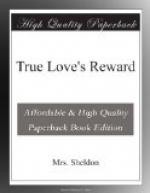Mona started at this last revelation, and light began to break upon her mind.
“How did you find me out?” she inquired, in a low tone.
“I had a letter telling me that my seamstress, who called herself Ruth Richards, was no other than Mona Montague—the last person in all the world whom I would have wished to receive into my family—and that she was having secret meetings with Raymond Palmer.”
“Who wrote that letter?” Mona demanded, with heightened color.
“I do not know—it was anonymous; but I was convinced at once that you were Mona Montague, from the fact that you were having secret interviews with Ray Palmer, for his father had told me of his interest in her. Of course I instantly came to the conclusion that you were plotting against me, and, though I did not believe that you could prove your identity, or your mother’s legal marriage, I feared that something might occur to trouble me in the possession of my fortune; so I resolved to marry you to Louis and settle the matter for all time.”
“Then that was why you started so suddenly for the South?” Mona said, with flashing eyes.
“That was not my only reason for going,” returned Mrs. Montague, flushing. “I—I had a telegram calling me to St. Louis, and so thought the opportunity a fine one to carry out my scheme regarding you.”
“And did you suppose, for one moment, that you could drive me into a marriage with a man for whom I had not the slightest affection or even respect?” Mona demanded, bending an indignant look upon the unprincipled schemer.
“I at least resolved that I would so compromise you that no one else would ever marry you,” was the malicious retort, as the woman turned her vindictive glance from her to Ray.
“Nothing could really compromise me but voluntary wrong-doing,” Mona answered, with quiet dignity, “and your vile scheme was but a miserable failure.”
“I do not need to be twitted of the fact,” Mrs. Montague impatiently returned. “My whole life has been a failure,” she went on, her face almost convulsed with pain and passion. “Oh! if I had only destroyed that marriage certificate you would never have triumphed over me like this; you would never have learned the truth about yourself.”
“Oh, yes, I should,” Mona composedly returned, “and even my trip to New Orleans resulted advantageously to me.”
“How so?” questioned her enemy, with a start, and regarding her with a frown.
“An accident revealed to me, on the last night of our stay there, the whole truth about myself. Up to that time I was entirely ignorant of the fact that my supposed uncle was my father, for I knew nothing about the discovery of the certificate until my return from Havana.”
“What do you mean?—what accident do you refer to?” Mrs. Montague asked.
“The day I was eighteen years old I asked my father some very close questions regarding my parentage, of which I had been kept very ignorant all my life. Some of them he answered, some of them he evaded, and, on the whole, my conversation with him was very unsatisfactory; for I really did not know much more about myself and my father and mother at its close than at its beginning.




